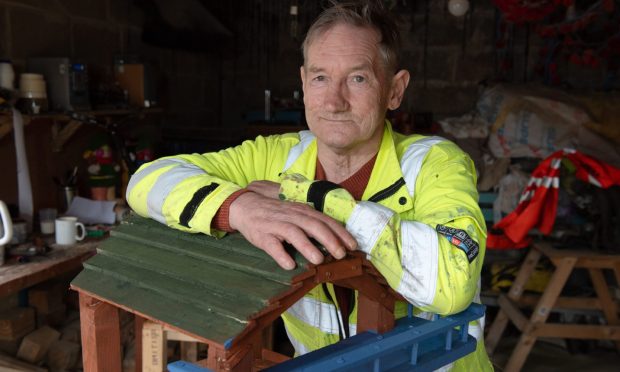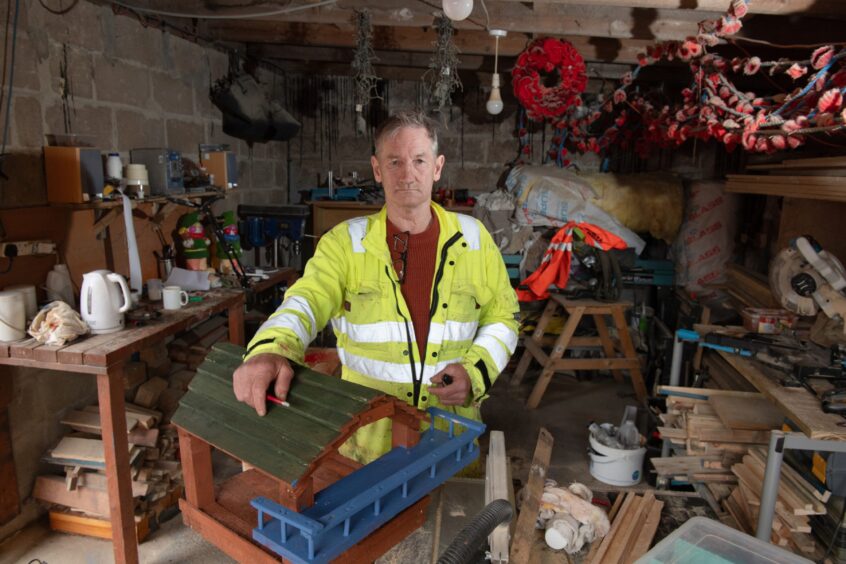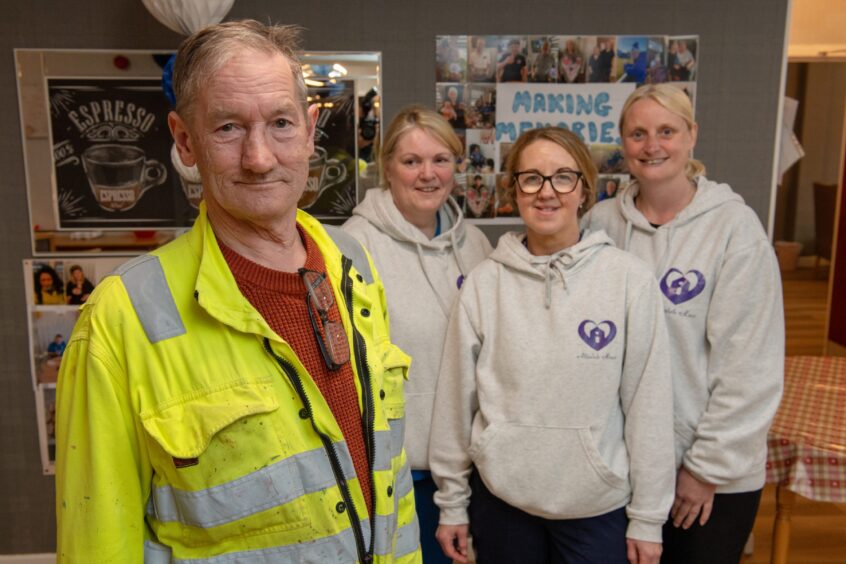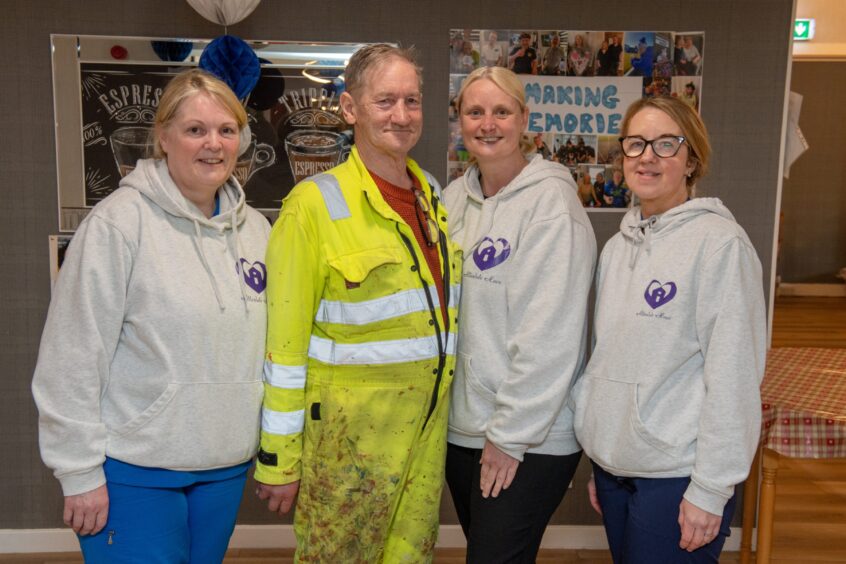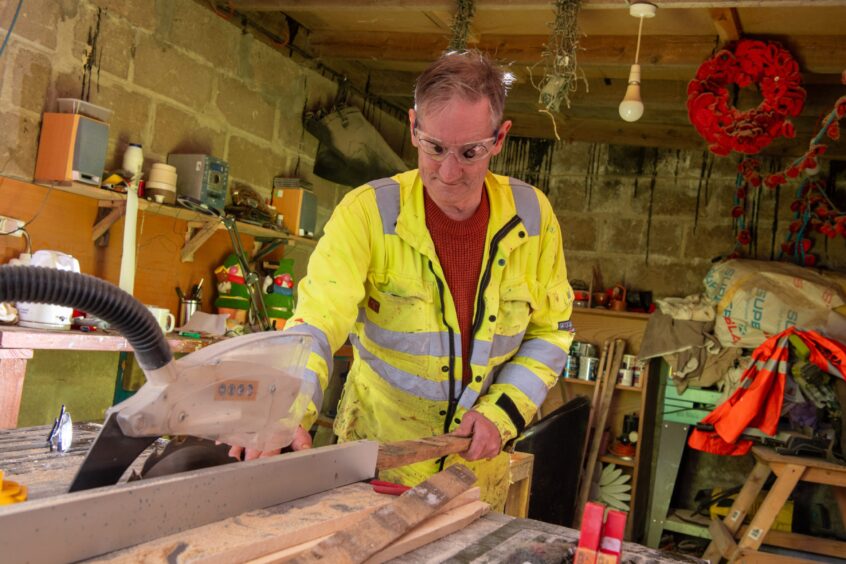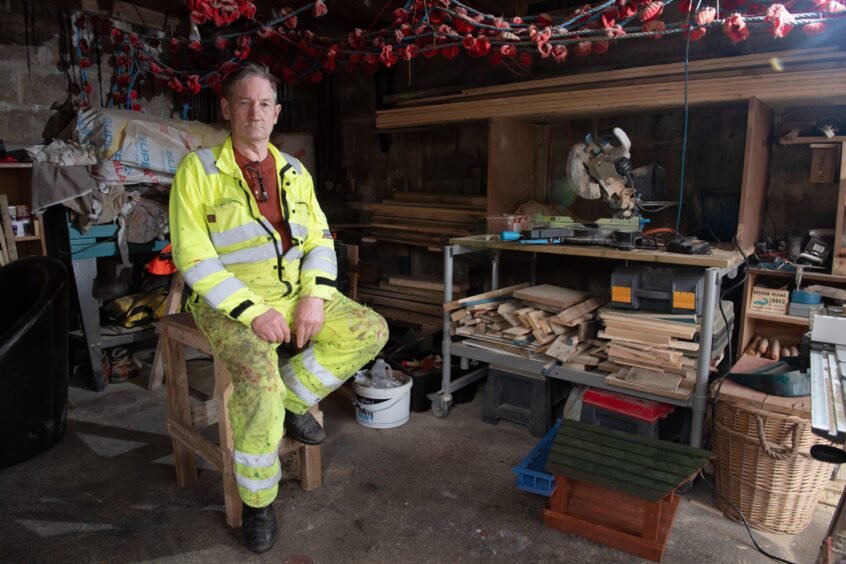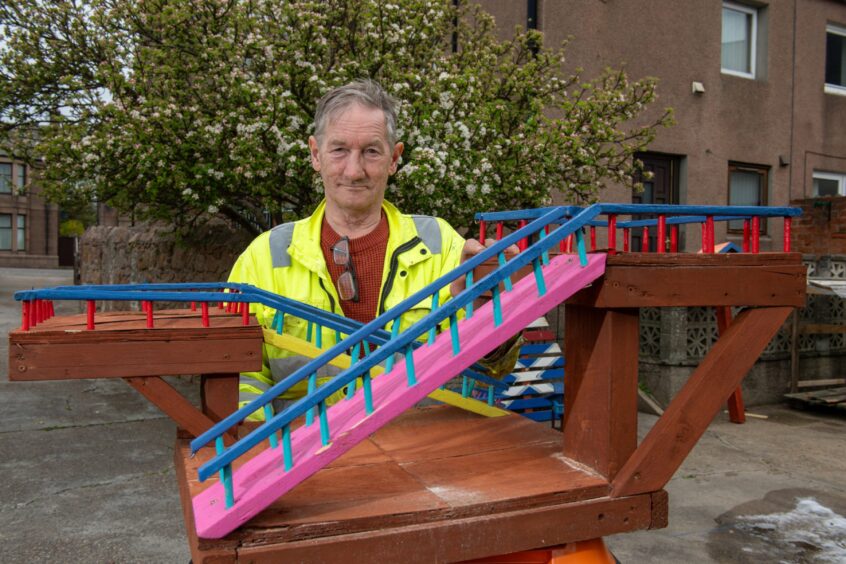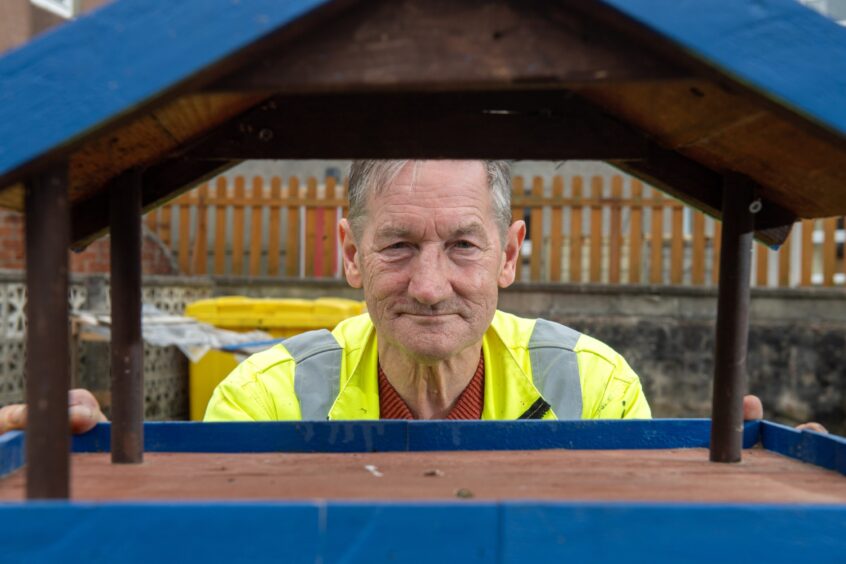We are standing in Tam Mitchell’s workshop behind the Allandale House care home in Peterhead.
Tam, a former alcoholic, has already outlined the circumstances that brought him here two and a half years ago — the two bottles of whisky a day that meant he couldn’t even walk or talk, never mind look after himself.
There was the move into Allandale House, plus the occasional escape attempts that ended in Tam sitting in a nearby park with a bag of booze.
But there was also the slow turnaround, helped by the staff at Allandale care home, who nudged Tam towards sobriety.
There was the effort find something for him to do instead of drinking, a process that rediscovered Tam’s love of tinkering, mending and repairing (“My brains not that good but my hands are,” he jokes).
Now, Tam escapes every day to the workshop he’s helped build out of an unused garage. It is filled with tools that that have either been donated, salvaged from elsewhere or, in a few cases, bought from the local B&Q in a rare opening of the purse strings from Allandale’s manager Sarah Wright.
It been a roller coaster ride for Tam. But one thing he is sure about. While many people view care homes as a place people go to die, he went in and found life.
“If it hadn’t been for here I’d be dead by now,” he says. “Without a doubt.”
Why Tam can be an example for care homes to follow
For those who work at Allandale, Tam’s story is a rare chance to talk about the benefits that care homes can have on their residents.
Sarah, who has been the manager in Peterhead for 18 years, knows all about the bad press her industry can receive; news reports of badly-run homes, under-pressure and underpaid staff and stories of neglect and abuse.
Allandale, however, is often held up as an example of the best in the business. Last year, it was awarded top marks by the Care Inspectorate, the government agency that oversees all care homes in Scotland, and praised for building “meaningful” relationships with residents.
When I met Tam, Sarah comes out to chat. The two bounce off each other like a headteacher with a particularly cheeky pupil. (“You’re no allowed in this place!” Tam jokes when Sarah tries to enter the workshop. “Nothing for you in here.”)
But the bond between them is clear, no doubt forged through the dark days when Tam first moved into Allandale. (“We’ve had our battles,” Sarah says, pointedly.)
‘We’ve got a lot of positives’
It is also clear that Sarah puts a lot of time and effort into improving the lives of those in her care.
For her, Tam is one of the best examples of how that time and effort can pay off. That’s a message she would like others to hear, and an example she hopes can be repeated across the industry.
“You always hear negatives [about care homes], you don’t often ever hear positives and we’ve got a lot of positives,” says Sarah, who is adamant that “coming into a care home doesn’t mean the end of your life”.
The job, she continues, is the treat the relationship with the residents as a friendship, one that starts when the person comes in the door.
“The past is the past,” she says. “We’re starting off fresh.”
She admits that doing it this way requires a level of training, leadership and commitment from staff that Allandale is fortunate to have. But, as Tam shows, it is worth it. From someone who needed almost constant attention, he now looks after himself.
“What we’ve done is create a wee community within the home,” Sarah says. “There’s certain service users who absolutely need full help with everything and we’ve got people on palliative care.
Sarah pauses before adding brightly: “And then we’ve got Tam.”
How Tam stopped drinking and rediscovered a hobby
When Tam first turned up at the care home — initially for a two-week respite period — Sarah says he wasn’t allowed outside without someone with him.
“He’d have tried to abscond,” she explains. “We had to change the code on the front door because he got it from somewhere. He was some lad for all that.”
Tam is originally from Galashiels in the borders but at the time was living in Banff.
He says he was drinking for “various reasons” and that life had just got on top of him.
He wanted to stop drinking, and had even gone cold turkey a couple of times before a doctor told him not to. His body couldn’t handle the shock of it.
After the two-week respite, he was still drinking, but not as much. He decided to stay, and then a visit from a local branch of men’s mental health charity Men’s Shed, which did some gardening work at Allandale, rekindled his lifelong love of using his hands.
“I used to do all that when I was younger,” Tam says, adding that as a child he dug up all the potatoes in his parents’ garden in an attempt to see what made them grow.
“It just brought back memories.”
He started powerhosing the grounds, helping to keep the place clean. Next he fixed the roof of the care home’s outdoor smoking area.
“It just progressed from there,” says Sarah.
Making bird tables for charity
Tam now spends most of his day in his workshop. He still drinks, but only a glass of whisky a night, provided by Sarah, who hold the key to the drinks cabinet.
“She sometimes gets me a bottle of malt,” he says with a gleam in his eye.
Outside of fixing things around the care home and painting garden ornaments in bright colours, he focusses most of his attention on creating his bird tables.
He started making them for one of the staff members at Allandale, and they quickly gained attention around the community.
Built out of wooden pallets donated by people around Peterhead, the bird tables have got increasingly more intricate and colourful, and Tam now sells them for charity.
“At Christmas he made these wooden Christmas trees and he sold a heap of them,” says Kelly O’Brian, Allandale’s engagement manager, who has also joined us in the yard.
“He made about £300 and folk were sending photos of them outside their houses. He’s famous all over, really.”
All the money goes to Erskine Veterans Charity, a nod to Tam’s military past, though it seems Tam gets as much out of making the bird tables as anyone else.
“This place keeps me happy,” he says, looking about his workshop.
The ‘inspirational story’ that shows life can go on
Staff at Allandale are under no illusions that Tam is a rare case when it comes to care home rehabilitation. Not everyone will have the same experience he has had.
But they are happy that there is at least one good story to tell that can motivate others to follow their lead.
“All you see in the paper about care homes is that this person has been abused or this carers been struck off,” Kelly says. “It’s really far from stories like this, inspirational stories where it’s not the end. Life can go on.”
Tam, who is listening beside us, jumps in, a big smile on his face.
“As long as the police don’t find my cannabis plants growing on top of the roof.”
Sarah and Kelly smile themselves, but a bit more ruefully.
“You needn’t bother,” Sarah replies. “I tell you what you’ll be getting your P45 if that’s the case.”
As they argue like any other family, I leave them to it.
